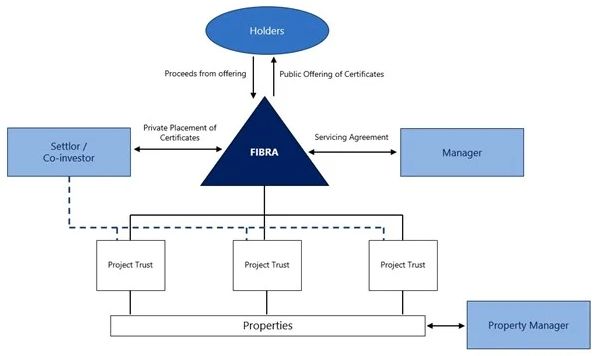
To print this article, all you need is to be registered or login on Mondaq.com.
Real estate investment trusts (“FIBRAs”) are
structured financing vehicles that-by means of the contribution
(whether direct or indirect) of a certain real estate portfolio to
the corresponding trust estate and their subsequent issuance and
offering of real estate trust certificates (“CBFIs”) in
the Mexican stock market-are used to raise funds for investing in
(i) real estate development, commercialization or
management; (ii) companies that carry out such
investments; (iii) securities or rights of any kind over
such real estate assets; or (iv) a combination of any of
the foregoing.
FIBRAs emerged at the end of 2003 as a result of tax law
amendments to attract investment in large-scale real estate
projects. As a result, FIBRAs became an attractive asset class
especially for those investors (e.g., retail investors or
institutional investors such as Afores, insurance companies and
surety companies) who wanted to diversify their investments safely
and securely. Additionally, investment returns related to FIBRAs
are easily predicted given that FIBRAs are engaged in the
acquisition or development of real estate assets for subsequent
leasing purposes, which makes investment returns fixed or even
increased by the revaluation of the underlying assets of the
issuing trust of the CBFIs.
FIBRAs became popular in the stock market as an alternative to
traditional investment schemes. Moreover, FIBRAs offer several
benefits (especially regarding taxation) both for the settlor that
transfers the real estate to the equity trust and for the CBFI
holders. Benefits include:
- FIBRAs offer a way to diversify investment portfolios and
consequently reduce risk. - FIBRAs are obligated to allocate to investors (i.e.,
CBFI holders) 95% of the taxable income (resultado
fiscal), at least on a yearly basis, and to keep at least 70%
of the trusts’ assets invested in real estate assets that
comply with local legal and regulatory provisions. - FIBRAs’ taxable basis (base gravable) consists
only of taxable profits (contrary to what would apply to
traditional companies, where the gross profit is the taxable basis
for income tax purposes). Therefore, the distributable cash
available to the CBFI holders is higher considering that the amount
has not been taxed prior to such allocation. - The withholding rate for cash flow distributions (dividends)
made by FIBRAs to foreign investors is equivalent to the
traditional corporate withholding rate, with certain
exceptions. - Capital profits derived from the price increase of the CBFIs
are exempt from income tax provided that the CBFIs are sold through
an authorized stock exchange in Mexico. - FIBRAs offer direct exposure to assets that are historically
developed to increase their value over time (capital gains). - CBFIs are governed by securities issuance regulations and have
a high standard of corporate governance.
FIBRA typical structure1

Footnotes
1 It is not necessary for the FIBRA Manager to be an
entity external to the vehicle itself. In recent issuances of CBFIs
carried out by a FIBRA, some structures with an
“internalized” Manager have been adopted, which has
additional benefits and challenges.
Visit us at
mayerbrown.com
Mayer Brown is a global legal services provider
comprising legal practices that are separate entities (the
“Mayer Brown Practices”). The Mayer Brown Practices are:
Mayer Brown LLP and Mayer Brown Europe – Brussels LLP, both limited
liability partnerships established in Illinois USA; Mayer Brown
International LLP, a limited liability partnership incorporated in
England and Wales (authorized and regulated by the Solicitors
Regulation Authority and registered in England and Wales number OC
303359); Mayer Brown, a SELAS established in France; Mayer Brown
JSM, a Hong Kong partnership and its associated entities in Asia;
and Tauil & Chequer Advogados, a Brazilian law partnership with
which Mayer Brown is associated. “Mayer Brown” and the
Mayer Brown logo are the trademarks of the Mayer Brown Practices in
their respective jurisdictions.
© Copyright 2020. The Mayer Brown Practices. All rights
reserved.
This
Mayer Brown article provides information and comments on legal
issues and developments of interest. The foregoing is not a
comprehensive treatment of the subject matter covered and is not
intended to provide legal advice. Readers should seek specific
legal advice before taking any action with respect to the matters
discussed herein.
POPULAR ARTICLES ON: Finance and Banking from United States






